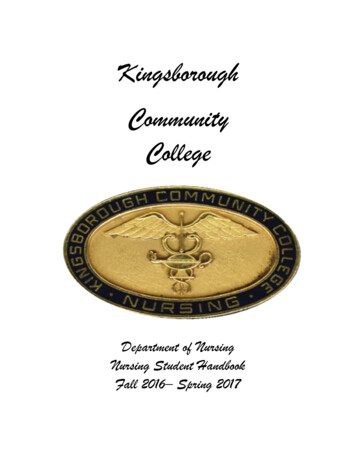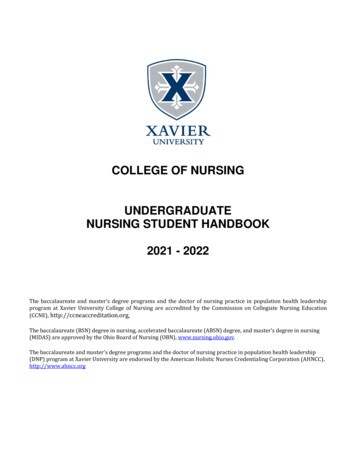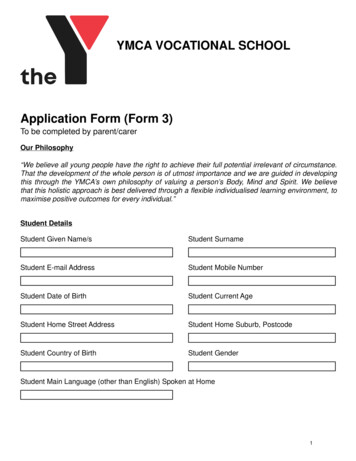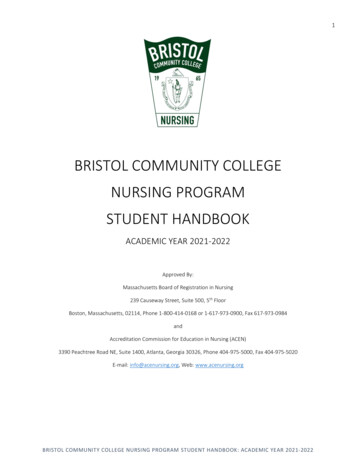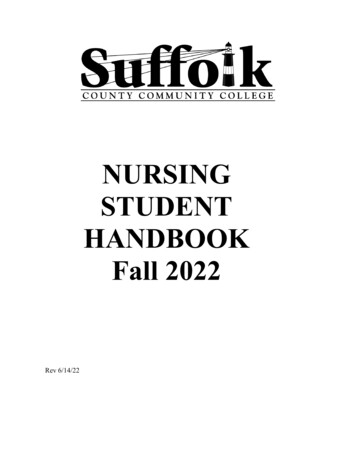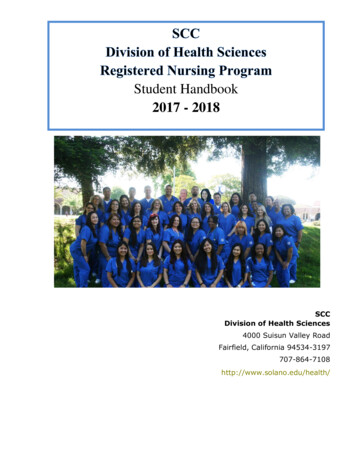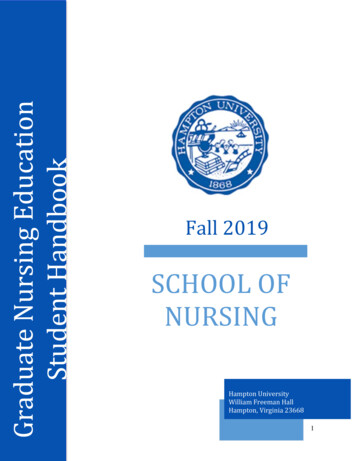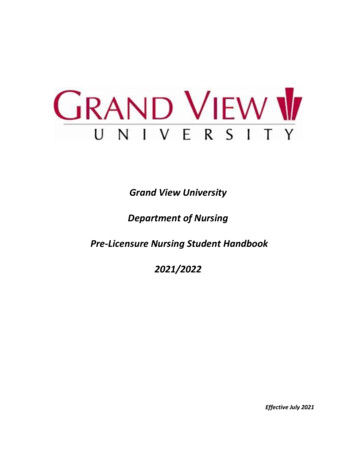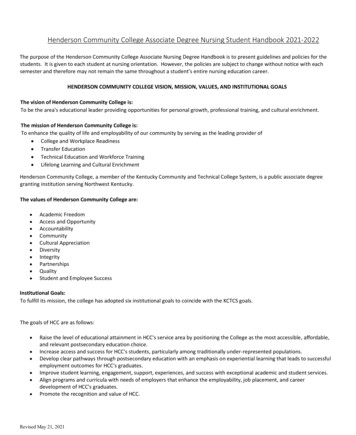
Transcription
Nursing DepartmentNursing Student Handbook2018
TABLE OF CONTENTSINTRODUCTIONBrookline College HistoryAccreditation and ApprovalsBrookline College Mission StatementBrookline College ObjectivesBachelor of Science in Nursing (BSN) Program Mission StatementBSN OutcomesMaster of Science in Nursing (MSN) Program Mission StatementMSN OutcomesNursing Department PhilosophyNursing MetaparadigmsEducational PhilosophyProfessional CharacteristicsAcademic Integrity (Dishonesty), Plagiarism, andCopyright Infringement11122233345577ACADEMIC POLICIESPolicy StatementTeaching/LearningCourse SyllabiAttendanceSatisfactory Academic Progress (SAP) StatementStudent Nurse Action PlanAlbuquerque Inclement Weather Policy99999121212STUDENTS RIGHTS AND RESPONSIBILITIESCPR CertificationLearning Resource CenterNursing LaboratorySmokingDrug-Free EnvironmentDrug Screening “For Cause” TestingReadmission Guidelines Related to Substance AbuseDrug ScreeningStudent Dress CodeStudent Participation in Outside Service Projects While in UniformCourse/Faculty/Program EvaluationsCommunication StrategiesOnline Student Identity Authentication and PrivacyComputer RequirementsResolution of Student ConcernsAppeal Process for All StudentsProfessional OrganizationsStudent Nurses AssociationNursing Student Ambassador ProgramDepartment 2020212121i
STUDENT SAFETYLiability and Health InsuranceRequired Health InformationLatex Allergy/SensitivityExposure GuidelinesInjury/Accidents222222232323BACHELOR OF SCIENCE IN NURSING (BSN) PROGRAMCurriculum: Traditional BSN TrackCurriculum: BSN/BDG TrackCurriculum: BSN/RN TrackCurriculum: BSN (enrolled after 1/1/17 – Phoenix Only)Curriculum: BSN/BDG (enrolled after 1/1/17 – Phoenix Only)Admission RequirementsGrading System - Bachelor of Science in Nursing ProgramAcademic Progression232425262728292930PRELICENSURE BSN POLICIESExaminations/AssignmentsStudent Support for NCLEX SuccessClinical and Laboratory CompetenceMedication Calculation CompetencyClinical Experiences/Student AssignmentsSafe PracticeClinical PreparationClinical EvaluationMedication AdministrationMedication ErrorsElectronic DevicesRecording LecturesSocial MediaWorking during the Program/Health Habits313131313232333333343434343435MASTER OF SCIENCE IN NURSING (MSN) PROGRAMCurriculum Plan: MSN TrackCurriculum Plan: MSN-HSA TrackAdmission RequirementsGrading SystemAcademic ProgressionPracticum ExperiencePracticum Course Requirements3535363636373737APPENDICESAppendix 1 Student Nurse Action Plan FormAppendix 2 Brookline College Nursing Student Ambassador ProgramAppendix 3 Brookline College Nursing Student AmbassadorProgram ApplicationAppendix 4 Brookline College Nursing DepartmentExamination GuidelinesAppendix 5 Nursing Student Handbook Acknowledgementii3839404142
INTRODUCTIONThis handbook augments the Brookline College catalog and serves as a source of important informationfor students in the nursing program. It will inform you about important Nursing Department requirementsand describe expectations of nursing students. It is a reference source for information about academicrequirements, Nursing Department policies, and students’ rights and responsibilities.The information contained in the Nursing Student Handbook is subject to change at any time. Studentswill be notified of changes through classroom announcements, email, the Nursing Departmentcommunications board, and on the Nursing Department website.Brookline College HistoryBrookline College was originally incorporated and licensed in Arizona on October 18, 1979 as ArizonaInstitute of Business and Technology (AIBT), a non-profit business and technical school. The institutionwas accredited in 1982 by the Association of Independent Colleges and Schools (now the AccreditingCouncil for Independent Colleges and Schools, ACICS). In 1999, ACICS awarded AIBT Junior Collegestatus and granted approval for the institution to offer the Associate degrees at all campus locations.In 2001, AIBT was awarded Senior College status by ACICS and received approval to offer Bachelor ofArts degrees via online delivery. In 2002, Arizona Institute of Business and Technology becameInternational Institute of Americas (IIA) and opened a campus in New Mexico.The planning of the Nursing Department began in 2001 culminating in its provisional approval by theArizona State Board of Nursing in 2004. In 2004, IIA also received formal approval from ACICS toaward an Associate of Arts degree in Nursing. Subsequently in early 2005, IIA officially opened itsNursing Program at 43rd Avenue and Bethany Home Road as part of the Phoenix Campus. The Schoolwas initially named after Ms. Ethel Bauer because of her tireless work in education and her passion toprovide opportunities for others to advance their careers. The Ethel Bauer School of Nursing is nowknown as the Brookline College Nursing Department.In July 2007, the Hamilton White Group IIA, LLC (now Brookline College, LLC) purchased the assets ofIIA, and changed the school's name to IIA College in March 2008. In June 2009, the institution wasrenamed Brookline College.In June 2010, Brookline College received approval to offer baccalaureate degrees via residential andonline delivery. In June 2011, Brookline College received approval to offer master degrees via residentialand online delivery.Accreditation and ApprovalsBrookline College is accredited by the Accrediting Council of Independent Colleges and Schools(ACICS) and the Accrediting Bureau of Health Education Schools (ABHES) to award certificates,diplomas, associate degrees, bachelor’s degrees, and master’s degree. Brookline College is licensed andapproved to offer the nursing programs by the following state agencies:Arizona State Board of NursingArizona State Board for Private Postsecondary EducationNew Mexico Board of NursingNew Mexico Higher Education DepartmentThe Brookline College – Baccalaureate (BSN) nursing program in Albuquerque has been granted initialaccreditation by the Accreditation Commission for Education in Nursing (ACEN) (3343 Peachtree RoadNE, Suite 850; Atlanta, Georgia 30326; 404-975-5000; www.acenursing.org).1
The baccalaureate/master’s nursing program at Brookline College is accredited by the Commission onCollegiate Nursing Education, One Dupont Circle, NW, Suite 530, Washington, DC 20036, and (202)887-6791.Brookline College Mission StatementBrookline College is an independent, accredited institution dedicated to meeting the educational needs ofa developing multicultural society. The institution is committed to preparing students academically andprofessionally to meet the constantly changing employment requirements of business, industry, publicservice organizations, and medical support agencies functioning in a highly advanced and expandingtechnological community.Brookline College ObjectivesThe objectives of Brookline College are to:1. Provide comprehensive, concentrated, qualitative educational programs, which will guidestudents through the development of the competencies needed to meet the employmentrequirements in a highly technological environment.2. Provide services that will support a diverse student body in their pursuit of postsecondaryeducation on a variety of levels and eliminate the barriers to the completion of their educationalobjectives.3. Provide innovative approaches and methodologies in a non-traditional educational environmentemphasizing a multiplicity of skills.4. Recognize and integrate lifelong learning and academic experiences as they would apply to eachstudent’s program of study.5. Provide students with access to faculty members whose academic qualifications and practicalexperience will provide the valuable leadership necessary to prepare students for successfulintegration into the workplace.6. Provide learners with the academic, cognitive, and professional skills necessary for careeradvancement.7. Provide all students with a hands-on working knowledge of information technology proceduresand applications.Bachelor of Science in Nursing (BSN) Program Mission StatementThe mission of the Nursing Department is to prepare highly competent professional nurses to addresscomplex human needs within a multicultural environment that will improve the health of individuals,families, and communities through the discovery and dissemination of nursing knowledge and thetranslation of science into practice. Faculty facilitate the education of students in the art and science ofnursing to provide ethical, holistic, culturally competent, evidence-based care in collaboration with othermembers of the healthcare team in a variety of health care settings within a constantly evolving healthcare environment. Students, as members of the community in which they receive their education, arestakeholders in the health and welfare of the community they will serve.2
BSN OutcomesThe Nursing Department has seven (7) student learning outcomes that are derived from the College-widelearning goals, Department mission and philosophy, and professional standards of practice. The graduateof the BSN program:1. Utilizes the nursing process and critical thinking as tools to make culturally-sensitive patientcentered clinical decisions in all health care settings within systems-based environments.2. Collaborates with patients and other members of the healthcare team in the planning,coordination, and provision of competent care.3. Integrates evidence-based findings into nursing and collaborative practice.4. Promotes patient and staff safety utilizing the process of quality improvement based on availableevidence.5. Uses information and technology for communication, knowledge development, and clinicaldecision making.6. Demonstrates leadership behaviors and professionalism when providing care to patients across thelifespan in all health care settings.7. Integrates legal, ethical, and professional standards into nursing practice.The Nursing Department has established five (5) BSN program outcomes. These are:1. NCLEX pass rates: Graduates will achieve a first-time NLCEX-RN pass rate above the nationalaverage. *2. Program completion: 75% of students enrolled in the program will graduate within 150% of thepublished program length.3. Program satisfaction: 85% of graduates will agree or strongly agree they are satisfied with theBSN program.4. Employer program satisfaction: 80% of employers will agree or strongly agree they are satisfiedwith graduates’ competencies.5. Post-graduate activity: 80% of program graduates who pass the NCLEX examination will beemployed as registered nurses within twelve months of graduating or will be enrolled in agraduate program in nursing.*Students in the BSN/RN track are already licensed as registered nurses and therefore outcomes ofNCLEX pass rates are not evaluated for this track.Master of Science in Nursing (MSN) Program Mission StatementThe mission of the Brookline College graduate nursing program is to provide students with theknowledge and skills needed to build upon and advance their nursing practice. Students will learn toapply advanced philosophies, theories, concepts, research findings, and skills to specialty practice.Graduates of the program will be equipped with the knowledge and competencies to assume roles asnursing leaders in multicultural healthcare and academic settings.MSN OutcomesThe Nursing Department has identified six (6) graduate-level Student Learning outcomes that are derivedfrom the College-wide learning objectives, Graduate Nursing mission, Department philosophy, andprofessional standards of practice. The graduate of the MSN program:1. Synthesizes concepts from nursing and other disciplines to build upon and advance professionalnursing practice.2. Integrates evidence-based advanced knowledge and skills into specialist nursing roles.3. Utilizes technologies that support specialist nursing practice through critical thinking, decisionmaking, and interprofessional collaboration.3
4. Demonstrates the use of leadership strategies that advance the design, implementation andevaluation of specialist nursing practice.5. Functions effectively as a change agent, member and leader of interprofessional teams toinfluence healthcare and nursing practice for individuals, families, populations, and systems.6. Analyzes the impact of social, political, economic, and technological trends in healthcare onnursing practice and healthcare delivery.The Nursing Department has established five (5) MSN program outcomes. These are:1. Program completion: 75% of students enrolled in the program will graduate within 150% of thepublished program length.2. Graduate program satisfaction: 85% of graduates will express they are satisfied or highly satisfiedwith the MSN program.3. Employer program satisfaction: 80% of graduates’ employers will express they are satisfied orhighly satisfied with graduates’ competencies.4. Job placement rates: 90% of program graduates will be employed in a specialty nursing rolewithin 12 months post-graduation.5. Professional achievement: 85% of program graduates will engage in continued professionalgrowth through membership in professional organizations, continuing education, specialtycertification, and/or doctoral study in nursing.Nursing Department PhilosophyThe Nursing Department philosophy is consistent with the mission statement of Brookline College andserves as a link between the Nursing Department and the college as it carries out the mission through thenursing curricula. Nursing Department faculty will regularly review and revise the nursing philosophyand program outcomes.The Nursing Department believes nursing is a professional, scientific discipline with academic andpractice dimensions. The discipline has as its primary focus the maintenance and promotion of healthachieved through collaboration with individuals, families, groups, and the community in a manner that isconsistent with society’s expectations and needs. The Nursing Department believes the baccalaureatelevel to be the essential educational preparation for professional nursing practice. Nursing should achievehigher levels of education and practice to the full extent of their education and training.The theoretical underpinnings of professional nursing practice derive from the related disciplines of thenatural sciences, social sciences, and nursing. The profession of nursing builds its knowledge basethrough the rigorous scientific inquiry of theory and practice that continues the process of theorydevelopment and provides the foundation for evidence-based practice. The nursing process establishes thefoundation for critical thinking and decision-making skills that allow complex independent judgments tobe made based on available data and knowledge.Nursing competencies are guided by professional standards and include psychomotor and interpersonalskills, collaboration, and leadership using the processes of critical thinking, problem solving, anddecision-making. Advocacy and caring are cornerstones of the role of the professional nurse who acts onbehalf of individuals, families, communities, and global populations.Nurses work autonomously within a defined scope of practice and collaboratively with members of thehealth team. Regulations and standards, such as those defined by state Boards of Nursing, the Scope andStandards of Practice, and the Code of Ethics for Nurses guide nursing practice as nurses are accountableto the public they serve.4
Scientific and technological advances and the increasing incorporation of nursing research into practicemandate involvement in lifelong learning. Commitments to continuous quality improvement, improvedpatient outcomes, enhanced patient safety, and active involvement within the profession are key elementsin professional nursing.Nursing MetaparadigmsPatientThe patient is the recipient of nursing care and may be a person, family, group, and/or community, eachmoving through its own unique developmental stages. The recipient of care may be conceptualized asholistic, encompassing personal, social, and physical dimensions. Patients are persons with uniquelifestyles, knowledge, beliefs, values, needs, and goals who interact dynamically with their environment,respond to health issues in individualized ways, and can make critical choices. They have a right toparticipate collaboratively with nurses in decisions and have shared accountability for outcomes. The roleof the professional nurse is to foster health promotion activities and to assist the patient/person inoptimizing wellness, including identifying and utilizing resources within all healthcare settings.EnvironmentThe environment comprises both the internal and external contexts of the individual and involvesdynamic forces which affect the health status of the patient. The environment includes forces that arephysical, cultural, social, political, economic, and spiritual. The larger society is a network ofrelationships that link individuals in families and groups. Individuals, as open systems, are in constantinteraction with the environment in a dynamic, mutual exchange. Professional nursing practice considersthe impact of the sociopolitical, legal, ethical, and economic forces on persons, families/groups, andcommunities.HealthHealth may be defined as the state of well-being at a given point in time for a patient. It is amultidimensional adaptive state within a constantly changing environment, characterized by wellness,illness, disease, or dysfunction. Health influences and is influenced by the patient’s developmental level.It is both objective and subjective and encompasses physical, psychosocial, and spiritual dimensions.Health is a relative state with parameters that may be defined differently by diverse cultures. Patients haveresponsibility for their health status through the health choices they make. The role of the professionalnurse is to foster health promotion activities and facilitate adaptation.NursingNursing is a professional, scientific discipline with academic and practice dimensions integrating theoryand practice. The science of nursing is the generation and application of a body of theoretical knowledgeto health care situations. The art of nursing is the synthesis of theoretical knowledge and the experience ofskills learned, translated into competent practice. Nursing care is patient-centered and provided topatients/clients in a wide range of health care settings with the goal of assisting them to achieve maximalhealth through interventions derived from evidence-based practice.Educational PhilosophyThe faculty of the Nursing Department believes that teaching-learning is a continuous, dynamic, andreciprocal process that varies with learner-centered, student encounters according to individual studentneeds and differences. Nursing Department faculty embrace and subscribe to development of a spirit ofinquiry and the ability to think critically in all students as these are essential attributes for all professionalnurses. Faculty pride themselves in promoting and facilitating student-centered learning that leads tostudent self-actualization. This process of fostering and promoting student-centered learning is afoundational and fundamental responsibility of nursing faculty.5
There is emphasis on the teaching-learning process as a component of the professional nurse role andstudents are encouraged and engaged throughout the nursing curriculum to move toward becomingcontributing and accountable members of the nursing profession and of a global society. Evaluation is astrong thread of the Nursing Department and there is evidence of this thread at all levels of the program,focusing on continuous quality improvement of the program against professional nursing standards andnational bench marks guiding nursing and healthcare delivery in a complex society. Systematic evaluationis conducted regularly by faculty, students, and others involved in the learning process.Educational ProcessNursing Department faculty believes the goal of the educational process is fourfold, to: Help a highly diverse student body become liberally educated professionals. Afford students an opportunity to explore and develop a personal philosophy of nursing that is builtupon a sound theoretical foundation and incorporates practice elements into a seamless continuum of“embodied know-how”. Achieve a balance between theory and practice to achieve fully, dimensional learning. Teach students to value the research process as one that builds on and adds to the foundation of nursingand health care knowledge.Academic EnvironmentNursing Department faculty believe in a learner-centered, facilitative academic environment that deliversnursing education to a diverse student body based on four values: The educational process partners students and faculty in collaborative mentoring relationships thattranscend traditional educational boundaries. The infrastructure aids flexible educational efforts rather than having the infrastructure dictate theeducation that may be offered. There is a synthesis of conceptual and theoretical information with the practical realities of the currenthealthcare environment. Higher education is made accessible to students who are adult learners, who may have families andwho may choose to work.Nursing Department ValuesThe Nursing Department faculty believe in the following eight values on which all nursing education isbased. Treat students as we treat each other, with genuine interest, egalitarian respect, and positive butrealistic expectations, all based on honest and open communication. Be committed to changing people’s lives and facilitating students’ desire to achieve an education,with a focus on living, learning, growing, and achieving. Be dedicated to providing education with passion and inspiration in a way that instills a commitmentto lifelong learning. Participate in out-of-class teaching and mentoring, whenever and wherever the teachable momentoccurs. Be committed to doing whatever it takes to help a student, whether in class, in an office, on thetelephone, or in e-mail. Provide contemporary experiential and theoretical knowledge engaging with students and bring asense of fun and adventure to the hard work. Participate in continuing education activities to promote professional growth. Support evidence-based learning activities.6
Professional CharacteristicsAs a profession, nursing places great reliance upon individual responsibility and accountability.Therefore, students are held responsible and accountable for their professional behavior.Personal CharacteristicsStudents are expected to exhibit personal and emotional characteristics consistent with the professionalnurse role. Students who do not manifest these characteristics may be referred to the Dean of Nursing ordesignee and advised or required to seek appropriate assistance. Students who refuse to obtain assistanceand/or persist in exhibiting inappropriate behaviors will not be permitted to continue in the nursingprogram. Students whose behavior indicates issues related to professional ethics and a sound moralfoundation place themselves at risk for course failure or dismissal from the program.Any cell phone device within the classroom, lab, or clinical setting will ONLY be used for educationalpurposes to perform research related to patients or assignments at appropriate times. No personalphotography is permitted in the Simulation or Clinical settings.Students may be dismissed from the program for exhibiting improper behavior or professionalmisconduct. Such behaviors include but are not limited to: rude or inappropriate behavior, fighting oncampus or institutional grounds, plagiarism, breaching patient/student confidentiality, compromising thesafety of a patient, or unsafe nursing care. The Brookline College Student Code of Conduct policy may befound in the College Catalog. Instances of such behavior may be documented and the student referred tothe Dean. While Brookline College supports the faculty-student mentoring model, it is not permitted forfaculty to engage outside of the learning environment within social media or non-school approved socialevents with a student.Academic Integrity (Dishonesty), Plagiarism, and Copyright InfringementBrookline College requires all students, faculty, and staff to conduct themselves and produce academicwork in an ethical manner. Students are expected to conduct themselves always with the highestacademic standards.Plagiarism is typically defined as the use of another person’s or a group’s words or ideas without clearlyacknowledging the source of that information, resulting in the false representation as one’s own work. Itis understood that plagiarism can be intentional and unintentional; therefore, the following descriptorsprovide the student with an understanding of how to avoid plagiarism. Plagiarism is also defined in otherways including the use of one’s own previous written work without citing and/or resubmitting it foranother course. In addition, plagiarism can occur when another’s words are used without quotation marksand/or citation provided. More specifically, to avoid plagiarizing, a student or other writer must givecredit when he/she uses: Another person's idea, opinion, or theory Any facts, statistics, graphs, drawing - any piece of information that are not common knowledge Quotations of another person's actual spoken or written words Paraphrases of another person's spoken or written words Another person's data, solutions, or calculations without permission and/or recognition of thesource, including the act of accessing another person's computerized files without authorization One’s own written ideas from the past or from another class (paper or discussion question)without providing proper citation. It is never acceptable to turn in a previous paper in its entiretyor with changes as if it were a new paper. This is considered academic self-plagiarism. Group thoughts as if one’s own paper created in Google Docs or other similar programPlagiarism may be either deliberate or unwitting. Regardless; it is the responsibility of a college student toknow what constitutes plagiarism, so they may avoid it. Ignorance is not a legitimate defense against a7
charge of plagiarism. Cheating, falsifying work, or plagiarism will not be tolerated. The penalties forthese offenses are as follows, but may not be linear in the event of an egregious act, requiring accelerationof the penalty process: First offense (in cases of lack of knowledge determined by leadership and faculty withinvestigation: Student receives a Student Nurse Action Plan form, coaching and counseling, andcompletes the Code of Conduct Reflection form. Additionally, the student must correct theerrors. The score is decided upon determining the what was plagiarized. For ex: if APAviolation, then the student loses the points for APA in addition to any other grading infractions. First offense (in cases of knowledge, but error included copying another’s work, using groupeffort for one’s own work). Student receives a “0” on the assignment or test coaching andcounseling from the course instructor and a Student Nurse Action Plan (SNAP) Form (located inAppendix 1) is completed and placed in the student file. The student is allowed to repeat theassignment to correct all areas of plagiarism. The repeat assignment is graded on a 30% reductionof points. If paper was copied knowingly, a 0 is given. Second offense: Student fails the course in addition to coaching and counseling from the courseinstruction and a Student Nurse Action Plan (SNAP) From (located in Appendix 1)is completed and placed in the student file. The student receives a grade of zero for theassignment. Third offense: Student receives coaching and counseling from the course instruction and aStudent Nurse Action Plan (SNAP) From (located in Appendix 1) and an "F" for the course Any further offense: Student receives coaching and counseling from the course instruction and aStudent Nurse Action Plan (SNAP) From (located in Appendix 1) an “F” for the course and maybe expelled from the collegeCopyright – Students, faculty, and staff must also be cognizant of and avoid copyright infringement.Copyright infringement is using someone else’s ideas or material, which may include a song, a video, amovie clip, a piece of visual art, a photograph, and other creative works, without authorization orcompensation, if compensation is appropriate. The use of copyright material without permission isagainst federal law, and penalties may include fines and/or imprisonment.As a consequence of expanded availability of digitized files and computing, peer-to-peer file sharing hasbecome common place. However, making a copyrighted material available to others through the use offile sharing networks (e.g., Google Docs, Shareaza, Kazaa, BitTorrent, eMule, or the like) is alsoprohibited by Brookline College and is considered copyright infringement. In addition to the potential forfederal penalties, Brookline College reserves the right to revoke the Information Technology privileges ofthose using or contributing to the use of file sharing networks to either access or provide use of or accessto copyright material.Academic IntegrityBrookline College requires all students to conduct themselves and produce academic work in an ethicalmanner. Students are expected to conduct themselves at all times with the highest academic standards.Behaviors that constitute irregular behavior or misconduct include but are not limited to: Giving or receiving assistance of any kind. Using, accessing, or attempting to access any prohibited aids. Prohibited aids are any devices ormaterials that will be helpful in taking the exam. Examples of aids that are prohibited areelectronic devices (e.g. cell phones, tablets, watches, etc.), conversion tables, dictionaries, etc. Attempting to take an examination for someone else. Bringi
nursing leaders in multicultural healthcare and academic settings. MSN Outcomes The Nursing Department has identified six (6) graduate-level Student Learning outcomes that are derived from the College-wide learning objectives, Graduate Nursing mission, Department philosophy, and professional standards of practice. The graduate of the MSN .
